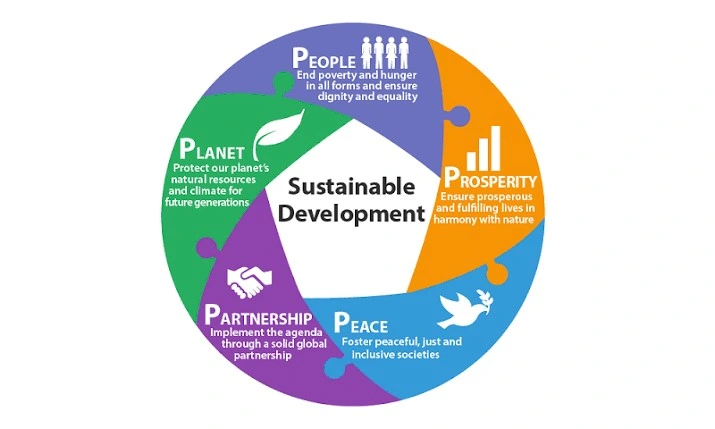Corporate Sustainability Goals

Corporate Sustainability Goals: For many years, the sole purpose of any company had been to create the greatest profit while maximizing its resources. A company that would succeed must have a target and must strive to reach the set goals. While chasing corporate targets and goals, we must be concerned about the effect our efforts have on us and society. We have been constantly notified about global warming and how the ozone layer has been depleting due to numerous industrial exhausts. This affects natural sustenance.
In 2020, the world experienced a ripping impact of the COVID-19. There was a shake in the global economy which disrupted the critical flow of supply chains and the labor market. No one anticipated what happened and it left us with a question: “How quickly can we improvise?”. Many company owners couldn’t even feed themselves not to talk of paying the salaries of their employees. There were no other means for them to run their company and the lockdown has crippled that.
Sustainability can be said to be an act of using or managing resources to prevent them from being depleted or from permanent extinction. Giving concern to our profit only puts us at risk of exhausting our resources. As an entrepreneur or manager or stakeholder, sustainability is very important. The United Nations has its goals with its scheme “Sustainable Development Goals (SDGs)”. They look at how to make life easier for people in rural areas.
Corporate sustenance also deals with how employers make life easy for their employees. Some employers have created a toxic working environment for their employees. They tend to overwork them to achieve the company goals. This is common in startup companies or private firms and companies. Some workers are forced to work overtime without any compensation but still carry on due to the unemployment rate in the world.
What are corporate sustainability goals?
Table of Contents
Corporate sustainability goals refer to voluntary efforts by companies to reduce the negative impact and increase the positive impact of their company. In the last few years, companies have been committing to sustainability. This is probably because of the obvious effect the company’s effort has on our environment and the government hasn’t stopped sensitizing people. Companies now set zero carbon goals, diversify their workforce or move into a new or cleaner line of business.
The sustainability plan is to meet the health standards of their customers and also gain profit. The competition in the labor market is harsh. People will not go for companies whose products affect them or the natural environment. An example of this can be seen with our personal computers. When laptops first came around, they emitted so much heat and radiation which health practitioners said affected human health – especially the male reproductive organ. The companies gradually started creating sleek computers that emitted little or no radiation at all.
Corporate sustainability goals come from the concept of “Sustainable Development”. A United Nations initiative – The World Commission on Environment and Development – defined this concept in 1987. It was defined as actions that meet the urgent and crucial needs of the present generations without compromising the needs of future generations. How do we create wealth and reduce poverty without harming the natural environment? How do we achieve maximum profit without putting humans and other factors at risk?
Corporate sustainability goals are a robust concept. Some companies might focus on environmental sustainability initiatives, while some might focus on sustainable goals for health, quality education, poverty, gender inequality, and so on. In recent times, companies have been under intense pressure to find sustainable ways of managing their actions – the creation of their goods and services and also the delivery.

Corporate Sustainability Goals 1
How corporate sustainability goals have evolved
It has been observed that corporate sustainability goals have evolved under three crucial generations for companies. It started from an initial focus on managing a minimal environmental impact on global value chains and social topics. We are considered to be in the third generation which is characterized by increased demands, ambition, technology, and productivity.
3 Generations of sustainability goals
Here are 3 Generations of sustainability goals:
– First Generation (the ’90s to ’00s)
This started in the late 1980s and became popular among companies in the 1990s. Companies began to take proactive approaches to reduce significant environmental impacts. They are more committed to voluntary goals such as hazardous waste, energy efficiency, air emissions, and wastewater. Companies were focused on compliance with voluntary environmental impact goals in this generation.
– Second Generation (the ’00s to ’10s)
Compared to the previous generation, companies are now focused on setting supplier, sourcing, product, and social goals. While the social goals were still uncommon, there was an obvious development rate.
– Third Generation (Today)
Company owners and sustainability leaders have sought to extend the impact of their efforts over the last few decades. They have expanded the scope and ambitions of their goals in numerous ways. They have also shown commitment to accountability for societal impacts and a better business set up.

Corporate Sustainability Goals 2
Common Corporate Sustainability Goals trends
1. Increased integration of both environmental and social impact into companies’ corporate sustainability goals. As part of their goals and focus, companies should integrate both environmental and social initiatives. A company that relies on drilling out raw materials must do so not to affect the public.
2. Competitive partnership for Corporate Sustainability Goals. Companies can partner with each other to pursue Corporate Sustainability Goals. Sharing ideas will lead them to get the best way of doing things.
3. Crowdsourcing and welcoming innovative ideas. By calling on global innovators to brainstorm ideas to address a specific challenge. This could be encouraged by putting a price for the person or group with the best idea. This idea also helps solve some challenges peculiar to a region.
4. Constant sensitization and advocacy for positive reform. There should be constant sensitization and advocacy for positive reform. Companies that have a large customer base can devise a way of sensitizing their customers on sustainability.
5. Focusing more on sustainable alternatives. Companies can also focus on alternatives for the resources they are using. This helps to reduce the stress on the resources of which the product is in high demand.
The difference between Corporate Sustainability goals and Corporate social responsibility
Corporate social responsibility focuses on a company’s ethical responsibilities. This is different from the corporate sustainability goals. The former deals with how responsible they want to appear to their staff and customers and the latter deals with how to reduce negative and increase the company’s positive impact. Since our ethics differs, this affects what ethics a company would possess due to their owners. However, what is ethical for a company may not be the same for another.
Company ethics differ from one another and also affect their output. For instance, a company might provide goods and services for average users while another company might focus on the people at the top of the wealth ladder. The second company indirectly tells us that they don’t make a product for the masses, and the rich like it that way. Corporate social responsibility doesn’t encourage fairness across generations, as it focuses more on meeting the present needs. Another example is the company’s salary scale of workers.
All of this points to how a business can operate on a broader scale, not just on short-term and self-interest.
You can also check out our other related article Sustainability Performance:
Why is Corporate social responsibility important
The business has become a powerful tool in the world today with some companies influencing lives more than some governments. In 2019, amazon recorded a revenue of $US281bn; this is larger than some countries GDP. Business owners now have the power to execute plans that create a better life for everyone or just a few of us.
Companies are being forced by demands from the government and NGOs to invest in sustainability. Falling short of standards might mean receiving a heavy sanction from the government or losing the license to operate.
Tips for setting strategic Corporate Sustainability Goals
Here are some important tips for setting strategic Corporate Sustainability Goals:
– Focus on issues that are important to your company:
To start with, focus on the area where you know your company can have a significant impact. Do you want to work in the production chain or the supply chain? This will help you while setting your goals. Know your strength and explore it.
– Set big goals:
This doesn’t mean you have to set unrealistic goals; it simply means setting feasible and ambitious goals. Even if you don’t know how to achieve your goals, just write them down. This will stimulate innovation, positive thinking, research, etc.
– Connect your goals to your business plans:
Do you have a plan? Connect your goals to your plans. Does your goal meet up with your company’s values? Linking up your goals and plans will help you to evaluate your productivity and management.
– Source for support:
Your goals might be too big for your present capacity and you might need to seek support.
Frequently asked questions:
Here are some Frequently asked questions:
Is climate change an effect of industrial activities?
Ans: Over the past few years, the adverse effect of industrialization on climate change and natural resources has been discussed. Industrial activities have a drastic impact on the natural world.
Are there sanctions for companies that are lacking in the required sustainable goals?
Ans: Yes, the government is placing heavy sanctions on companies that do not comply.
The three pillars of sustainability
Ans: Environmental, social, and economic pillar
Finally
Corporate sustainability goals have highlighted the mission and the challenges before us. Everybody must be up and doing in creating an environment that meets our present needs and doesn’t affect the future.
Like this project
Posted Jul 10, 2023
Corporate Sustainability Goals: For many years, the sole purpose of any company had been to create the greatest profit while maximizing its resources...
Likes
0
Views
3





